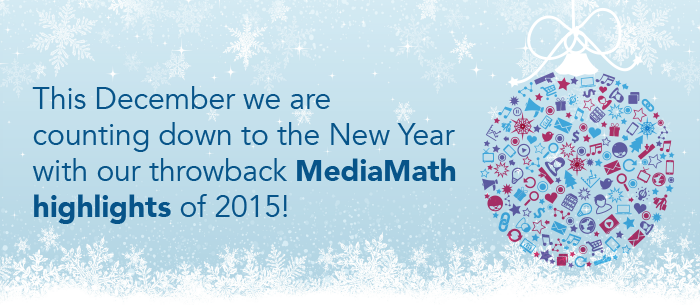NMI (New Marketing Institute) has officially trained more than 4,000 marketers on certification content, ending the year strong for 2015!
As we look ahead to 2016, here’s what NMI accomplished in the past year:
Exam Automation
Our subject matter revolves around an industry that demands automatic and real-time results, so why should our certification process be any different? In Q1 2015, NMI automated the exams for its certification courses. Through Classmarker, a professional online exam platform, questions can be answered digitally and results are given in real-time.
Certification Revamp
We completely revamped our certification offering to fall under a set of three tracks:
Our Introduction to Digital Marketing course has been a great way for those who are new to the space to get an overview of the industry at large. However, the feedback we received told us that people wanted more in-depth instruction specific to the programmatic space. We listened, so started providing Programmatic 101 in addition to Introduction to Digital Marketing.
We rebranded our T1 Platform courses under new names to clarify the intended audiences for both T1 Beginner and T1 Advanced, along with Upcast Social Beginner and Advanced. The T1 Beginner course instructs users in the basics of uploading creatives and adding pixels, putting together campaigns and strategies, as well as FBX, video creatives, and an introduction to “The Brain.” T1 Advanced covers optimization scenarios, a deeper dive into “The Brain,” and ongoing campaign maintenance.
Our Omnichannel certification offering is a three-session set to ensure marketers are current on initiatives aside from regular display – delving into the worlds of mobile, social, and video advertising online.
Language Translation Prioritization
As MediaMath continues to expand globally, it’s important for us to scale our certification offerings, so NMI has made it a priority to translate content for learners across the globe. We have translated our Grovo videos into 8 languages, and, through partnerships with translation services we have begun to translate all certification content into Spanish, Portuguese, Japanese and will continue to do so in 2016!
NMI in LatAm
MediaMath clients from the Latin American market had the chance to attend TerminalOne Platform training in November by dialing-in and getting live Spanish-language trainings. These trainings will be facilitated on a regular basis starting Q1 2016.
Marketing Engineer Program
This year marked the launch of our UK Marketing Engineer Program. Since June, we’ve run two programs and graduated six Marketing Engineers in London. In addition, we completed our third program in NYC. To date, 36 participants have graduated MEP, all of which have found full-time positions immediately after completing the program. They have found roles at MediaMath, as well as with partners and clients, working on teams such as Product, Programmatic Strategy, Analytics, Campaign Management, Publisher Solutions, and AdOps.
With the new year comes new changes to MEP. Our NYC program will be condensed to 13 weeks, aligning with our London program. And there will be even more opportunities for partners and clients to get involved. Recruitment for our 2016 programs are already underway, so if you’re interested in learning more, check out our MEP webpage.
Boot Camp / Masterclass Launch
NMI facilitated three customized Masterclass sessions this quarter in New York and London. All three were facilitated by Michelle Said and Vanessa DiSpena, with participants ranging from undergraduate students to industry professionals. The first Masterclass took place at MediaMath’s HQ at 4 WTC in New York City. The other two took place in London at Loughborough University and the Internet Advertising Bureau (IAB) UK, with the latter drawing an impressive crowd – including Mail Online, Marriott International, and Teads.TV, to name a few. The overwhelmingly positive feedback from these Masterclass sessions has led to a slew of exciting partnership opportunities for NMI in 2016…stay tuned!
IAB UK
Since July, MediaMath and NMI joined the board for the IAB UK, joining the ranks of other Industry leaders including, Google, Facebook and Twitter. As part of the board, we can now help guide the IAB’s strategic focus and collaborate on key industry and IAB initiatives. In addition, our Introduction to Digital Marketing Certification, Programmatic 101 and Omnichannel Certifications have been IAB endorsed – further strengthening our brand in the UK and beyond.
IAB Digital Leadership Program
Furthermore, we’re pleased to announce another partnership program with the IAB — the Digital Leadership Program. This curriculum is the first of its kind, created specifically for digital media professionals who are developing their skill set to become leaders in the space. Elise has been placed on the Advisory Board alongside other leaders in the digital marketing industry. The preliminary sessions will take place this October in New York City.
Step Up
NMI and Step Up are now official partners! Step Up is a non-profit group which works with high school girls, empowering them to become confidents, college bound and career focused women. Working on three programs with Step Up, NMI will be contributing content for them and hosting the girls on a monthly basis at WTC from October to June.
Start Up Institute
Our partnership with Start Up Institute has been a great success so far and more recently we have become involved in their partner projects. To date we have partnered with their students on multiple partner projects such as creating an NMI Social Strategy along with an NMI App – very exciting!
ATD Forum
NMI is proud to announce that Elise James-Decruise will be joining as a member of the Association for Talent Development (ATD) Forum Advisory Group, helping to shape forum activities through thought leadership and collaboration. The ATD Forum provides a unique opportunity to network, share and learn from colleagues in the learning and development space. In October, she got the opportunity to share NMI’s best practices and wins to senior talent development professionals at this years Fall Lab and looks forward to sharing her expertise in 2016.
Penn State Keynote
Elise James-Decruise presented a keynote speech at Penn State’s “Digital Week” in September to 100 Advertising/PR students to mark the university’s introduction of a new minor in digital advertising. During her presentation, Elise walked the audience through the history of digital advertising, simplified the complex acronyms and introduced them to the key players of the industry. This was an exciting event that kicked off the NMI/Penn State partnership that will officially commence spring 2016.
Award Wins!
Topping it all off, NMI being recognized by two prestigious learning and development leaders was the icing on the cake! We were acknowledged for the following:
| Brandon Hall – Excellence in Education
BEST CERTIFICATION PROGRAM – New Marketing Institute Certification Programs
BEST UNIQUE & INNOVATIVE LEARNING & DEVELOPMENT PROGRAM – Marketing Engineer Program, NMI
Chief Learning Officer – Learning In Practice
Elise James-Decruise received:
THE STRATEGY AWARD – Gold
THE INNOVATION AWARD – Silver
Congratulations to all nominees and finalists! View the full list of winners and photos of the Awards Ceremony here! |
|
With so many new ventures set in stone, we at NMI are excited to play an influential role within the programmatic marketing industry in 2016.










